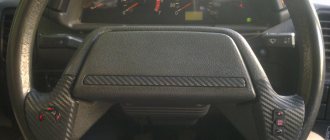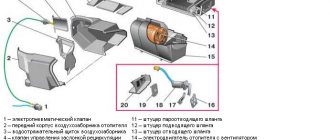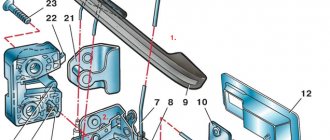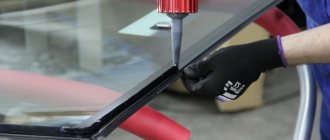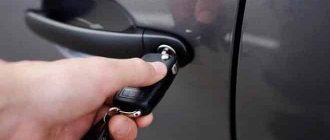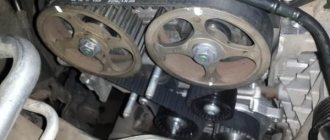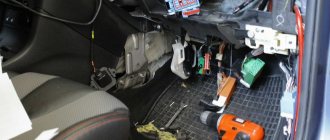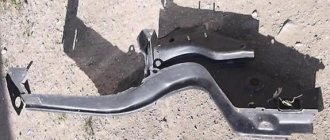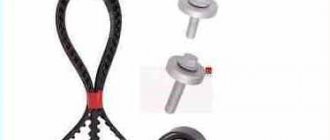The front-wheel drive sedan was produced by the Volzhsky Automobile Plant for 12 years. The last copy rolled off the assembly line in 2007. The model belongs to the budget segment, valued by drivers for its unpretentiousness to fuel, relatively good assembly, and maintainability.
The VAZ 2110 door lock is not a frequent consumable; its average service life is 3 years. Considering that the last VAZ 2110 was produced 12 years ago, standard parts need partial repair or complete replacement.
Principle of operation
The door lock of the VAZ 2110 car consists of two parts - mechanical and electronic (not in all trim levels). The mechanical part includes three types of working schemes:
- constipation;
- lever;
- blocking.
The main task of the locking mechanism circuit is to secure the door. The design uses a locking pawl and a turning latch. When the driver's door is closed, the turn signal latch moves behind the lock holder bracket. The pawl has two recesses - the main one and the additional one. With their help, the locking pawl holds the position of the rotary latch. When the door is completely closed, the pawl lever falls into the main recess. If the door is not closed completely, when the door is slammed, the rotary pawl falls into an additional recess and the door still remains closed, but a larger opening is visually visible. An additional recess is made for the safety of the driver and passengers.
The lever mechanism ensures the door opens. The force from the door handles is transmitted through the corresponding rods to the lever mechanism. It acts on the locking pawl. The rotary latch is released, rotated, and the mechanism opens. After the door is opened, the locking mechanism returns to its original position due to the action of the return spring of the lever mechanism.
The locking mechanism is designed to stop the opening mechanism. The cylinder is connected to the locking mechanism with a special rod and, using the ignition key, it locks the door.
Adjusting the lock
After 3-4 years of operation, drivers note a defect: one of the doors of the VAZ 2110 car begins to close poorly. For example, it is loose when the part sticks out when closed. It also happens the other way around: when you try to slam the door hard, it doesn’t close. In such cases, adjust the latch. To work you will need good lighting and special tools:
- a large screwdriver with a socket head at the end of the handle;
- a key that will be used as a lever;
- crosshead screwdriver.
Work order:
- Using a screwdriver and a square key placed over it as a lever, partially unscrew all three locking mechanism lock screws. This is necessary to move it relative to the plane on which it is mounted.
- If a closed car door protrudes outward relative to other body elements, then it is necessary to move the latch towards the passenger compartment.
- The adjustment is carried out experimentally. There are no clear parameters for how far the latch needs to be advanced.
During work, it is necessary to check the overall geometry of the body. If the misalignment of the doors occurs due to violation of the geometry parameters, then repair of the locking mechanisms will have to be carried out constantly.
- When the door does not close completely, even if a lot of force is applied to it, it is necessary to move the latch closer to the outer edge of the car body.
- If the gaps between the car door and the body are uneven, this can be corrected by moving the lock up or down. The defect is corrected by adjusting the door hinges, placing washers of various thicknesses.
After the lock is adjusted, the bolts are tightened as tightly as possible.
How to remove the lock
The mechanical door lock on the VAZ 2110 has a complex design. If the driver does not have repair experience, it is recommended to replace the spare part with a new one. Before replacement, the element must be removed from the car. To do this, remove the casing. The process of dismantling the door card in stages:
- Open the door, unscrew the three screws securing the bottom pocket.
- Move the lower part back slightly, slide it down, and remove it from the grooves of the casing.
- Using a thin screwdriver, pry up the cover on the closing handle and remove it.
- Unscrew the two screws located under the cover.
- Remove the handle by turning it slightly up and out of the hook with the door opening handle.
- Unscrew the locking latch.
- Use a screwdriver to unclip the plastic clips around the perimeter of the casing and remove it.
- After removing the casing, it is necessary to begin dismantling the parts of the locking mechanism.
- Disconnect the outer handle rod from the lock lever.
- Pull the cylinder rod out from the lock lever.
- Disconnect the inner handle rod by first removing it.
- Unscrew the two screws that secure the lock and remove the locking mechanism.
- Remove the internal lock. It must be removed together with the locking rod and the inner handle rod.
- Remove the lock traction blocker from the lever, first removing the plastic retainer from it.
- Using a screwdriver, pry it up and remove the locking bracket.
- Disconnect the outer handle pull cable from the lever and remove the lock completely.
Removal
2. Remove the plastic film from the door.
3. Using a Phillips screwdriver, unscrew the three screws securing the inner door opening handle.
4. Disconnect the inner handle rod from the lock:
a) Using an awl, remove the lock from the lock lever pin (see item 4, photo item 6).
b) Remove the washer and the rear end of the inner handle rod from the pin.
5. Remove the inner handle and rod assembly.
6. Using a slotted screwdriver, disconnect the plastic ends of the rod of the outer lock handle (3) and the rod of the switch (cylinder) of the lock (2) from the lock levers. The rod end of the lock lock button (1) does not need to be disconnected.
7. Disconnect the wiring terminals of the central locking switch.
8. Unscrew the two lock screws (see “The outer part of the front door lock - replacement”) and remove the outer part of the lock.
9. Remove the inner part of the lock assembly with the locking button rod and the central locking switch from the door.
Comment. A locking gear motor is installed in the front right door. We remove it in the same way as removing the rear door gear motor (see “Rear door lock - removal, installation and adjustment”).
10. Before removing the lock latch, mark its position on the B-pillar (with a marker or felt-tip pen).
Comment. Shims can be installed under the retainer. They should be put in place during assembly.
Door lock repair
In mechanical structures, repairs come down to replacing or restoring a faulty cylinder, cleaning and lubricating the internal lock mechanism, adjusting or replacing rods. It is not recommended to repair the internal locking mechanism itself, since it is assembled with rivets.
Even if the craftsman removes the rivets and is able to restore the operation of the levers, it will be difficult to put the body back together. If its parts fail, it is better to purchase and install a completely new locking block assembly.
If the door lock does not work correctly, when the key does not turn or the door does not close, you need to do the following:
- Remove the car door trim.
- Remove the door lock cylinder.
- Carefully disassemble the cylinder, thoroughly clean, rinse, lubricate, carefully reassemble in the reverse order and install in its place.
- Remove the internal locking element. Rinse and lubricate. If there is a malfunction, replace it with a new one.
- Check the serviceability of the closing handle mechanism, the door button, all parts are connected to the internal locking mechanism.
- Adjust the locking latch.
If an electronic central unit is installed on a VAZ 2110, then the part is repaired at a service station. Almost none of the car owners have the necessary tools and equipment to check the signal quality and repair the ECU.
Reassembly
Assembly is done in reverse order, but with one caveat. The perimeter trim is secured with plastic rivets, which are very fragile and often break when removed. Before installation, you must replace all of them with new ones. Otherwise, due to a loose fit, the casing will rattle when driving.
To replace, you only need a flathead screwdriver. It is necessary to remove the dowel from the door hole and insert a rivet into the trim. It is not recommended to leave old kits, they are disposable. When the door trim is ready for installation, first carefully press it against the door, trying to align all the rivets with the dowels. Next, apply light pressure along the perimeter to press it tightly. That's it, you can tighten the screws and put the speaker in place.
Now you know what to do if the door on a VAZ-2110 does not open from the inside. The repair budget will be about 200-300 rubles, the time cost will be no more than half an hour. Minimum effort will be required to fix this problem. The work is completely simple. This procedure is suitable if any front door on a VAZ-2110 cannot be opened from the inside. The actions in all cases are similar and do not require additional description.
To open the door of a VAZ 2112 from the passenger compartment, when you pull the opening handle, you need to pull the door towards yourself for it to open. Otherwise, if you don’t pull the door towards you, it won’t open, why?
- The front door does not close in cold weather on 2112 - 2 answers
- The passenger door of the VAZ 2112 does not open well - 2 answers
- The pneumatic-hydraulic struts of the fifth door of the VAZ 2112 work poorly - 2 answers
- The door does not close well on the VAZ 2112 - 2 answers
- Do I need to use sealant when replacing door seals? – 2 answers
Because the lock needs to be adjusted. The latch clamps, you need to move it a little. Just don’t close the door with loose screws, move it a little, tighten it, try it. And so on until you adjust it as needed. There the lock itself moves a little and the counter part is on the stand.
This is because the mechanism is worn out, there is a little wear here, a little there, but in the end we have what we have.
Even more useful tips in a convenient format
Guys, help, in general, the rear right door does not open, not from the outside or from the inside. It's as if it's jammed. How and what to do? maybe someone knows? There were frosts, the door froze, well, somehow I opened it, and then it completely closed and that’s it SO THE PROBLEM IS SOLVED I’ll try to do everything with pictures and explanations, since I’m not the only one, I hope the post won’t be deleted, as it might be useful to someone So, I removed the door card, naturally it was cramped and uncomfortable.
I had to unscrew the rear window guide (it looks like velvet glass seals) and the view became better. In order to understand what was working wrong, I opened and removed the same thing from the second door, closed it and began to study the result of what kind of thrust the lock has, we can say the total, or rather there are two thrusts (external and internal handle), then one of the locks are combined (it turns out like knee) when you open it from the street, one part of the knee moves, and when from the inside, the knee is assembled. I switch to the jammed door and observe that when opening the rod from the street, part of the knee moves like everything else (but this is just a part), I open it from the passenger compartment, the second part does not move and therefore the knee assembly also does not produce any action. Yeah, I see. I look at the working side.
When the door is closed, the center of the knee is at the top, but on my door it is at the bottom when closed, and thereby jammed and blocked this draft. Somehow I crawled up, and trying to lift this knee up, it worked, but not the first time. - I open it from the salon and the door comes loose, and says get out of here, I close the tongue on the open door, check the knee, everything is as it should be, I open it, everything works. Until I thought of this option, I tried as the guys here advised, namely, I tried to heat the castle with my mother’s hairdryer, it took a long time, it was terribly hot. If the tongue were frozen, it would thaw anyway IT DID NOT WORK FOR ME There is another option, as I understand it: we remove the back of the seat, pull out the seal, and a decent gap opens, in which you can see part of the lock and part of the bolt; if you try really hard, you can crawl there with something thin, and get into the lower part of the tongue on the lock and the door will open, I tried it on a working door, IT WORKS, but I didn’t have enough patience on a broken one, so this option DID NOT HELP me. So I think it will be useful for someone, but what if the moderators delete it? I’ll try to create an entry in the forum, only without pictures Thanks to everyone who gave advice, perhaps they will be the solution to the problem for others, but I had a slightly different problem PS leave an entry, it may be useful.
Source
Replacing the larva
In some cases, it is not necessary to change the entire door lock on a VAZ 2110. It is enough to limit yourself to replacing the larva, which may jam.
The cylinder is a small metal cylinder containing a mechanism that is turned by a key. Each such element is individual; only one key can fit it.
To dismantle and replace the cylinder, you will need a flat-head screwdriver and pliers. Step-by-step work:
- Remove the door card.
- Insert a screwdriver between the cylinder and the traction mechanism, turning them slightly, disconnect them.
- Pry up the bracket - a flat metal retainer, cylinders, and remove it from its seat with pliers.
- Remove the cylinder from the outside of the door and replace it with a new one, performing the work in reverse order.
Design of silent locks
The silent lock works on the latch principle, which allows you to close the car door very quietly and effortlessly. Structurally, the lock consists of the following main parts:
- internal structure;
- outer panel;
- finger.
The control rod from the door handles, the rod from the cylinder, as well as the locking buttons are connected to the inside. During installation, the structure is connected to the outdoor unit using screws. As a result, a single mechanism is formed.
When closing, the outer part engages with a locking bar, which is attached to the car body pillar. As a result, the door is held closed.
The latch pin is a part that is covered with a plastic shell.
In addition to the fact that the door no longer needs to be closed with a slam, an additional advantage of such structures is that their rubbing surfaces are covered with plastic; they do not require additional care in the form of constant cleaning and lubrication.
Regulation
If necessary (the door closes poorly, the door opens), adjustment is made using the latch. To do this, use an impact screwdriver to loosen the fastening screws and move the lock.
If it closes tightly - outwards, if it is loose - inwards, if there is a lifting of the door during closing - downwards.
Remember also that in order for the lock to operate silently, it should be lubricated every two to three months.
Didn't find the information you are looking for? on our forum.
Installation of silent locks
There are two ways to install a silent locking block - by first removing the door card and without dismantling the cladding.
Work to install a silent lock on the front door of a car without dismantling the door card is carried out as follows:
- Using a powerful power screwdriver with a socket head and a corresponding key used as a lever, unscrew the top screw securing the lock.
- Screw in a long pin of the same diameter instead. It will act as a holder for the internal lock so that it does not fall down.
- Unscrew the lower self-tapping screw securing the door lock.
- Remove the external lock.
- Place a silent lock on the hairpin.
- Tighten the bottom mounting screw.
- Unscrew the pin and screw in the top mounting screw instead.
- Using a reinforced screwdriver and a key, unscrew and install the standard lock latch pin.
- Insert a new plastic-coated locking pin.
- Wrap it as tightly as possible.
Now all that remains is to check how silently the new mechanism works. To do this, slam the door several times, opening and closing it.
Typical faults and solutions
Most often, VAZ 2110 owners encounter the following problems with the locking mechanism:
- It is impossible to close the door or a lot of force must be applied. Reasons: the latch is too moved inside the passenger compartment or the lock drives are incorrectly adjusted. Remedy: Move the lock outward slightly or adjust the drives.
- The door does not close completely and remains closed only in the first (emergency) position. Reason: The locking mechanism has failed. Remedy: repair or replace the locking mechanism.
- The door lock does not work. Causes: the locking mechanism has been adjusted incorrectly. Remedy: adjust the locking mechanism.
If the car has been converted to an electric lock, then it is necessary to diagnose the operation of the electrical signal from the key fob to the catchers, check the connection diagram and only then disassemble the door panel. The rear door lock is checked in the same way after diagnosing the central system.
Why did it happen so?
Perhaps the automatic requests do not belong to you, but to another user accessing the network from the same IP address as you. You need to enter the characters into the form once, after which we will remember you and be able to distinguish you from other users exiting from this IP. In this case, the page with the captcha will not bother you for quite a long time.
You may have add-ons installed in your browser that can make automatic search requests. In this case, we recommend that you disable them.
It is also possible that your computer is infected with a virus program that is using it to collect information. Maybe you should check your system for viruses.
